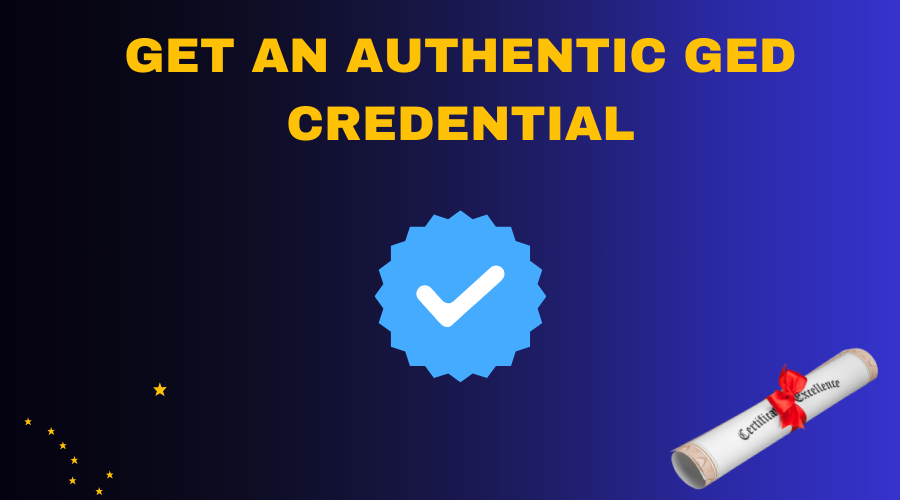Nearly every job opening across various occupational fields requires applicants to possess either a high school diploma or a General Education Development (GED) certificate. Employers prioritize conducting education background checks, also known as education verification checks, as a crucial step in the hiring process.
This process ensures the integrity and qualification of the candidates being hired. Moreover, it safeguards against resume fraud and degree misrepresentation, hence protecting current employees from potential workplace issues, and mitigating the costs associated with turnover and onboarding unqualified candidates.
Statistics indicate that 44% of candidates most frequently falsify their education credentials . Therefore, employers conduct thorough verification before hiring. To improve the chances of employment, applicants must present authentic GED credentials. Learn “how do you get a GED” through an authentic and proper procedure.
Importance of GED in Job Opportunities
The GED (General Educational Development) credential can be highly beneficial for candidates seeking better job opportunities:
Increased Job Eligibility
- Many employers require at least a high school diploma or GED as a minimum educational requirement for job consideration.
- Obtaining a GED opens up a wider range of job opportunities that may have been out of reach without this credential.
Access to Higher-Paying Jobs
- Studies have found that people with a GED credential tend to have higher wages and earnings compared to high school dropouts without a credential.
- GED holders can qualify for better-paying jobs in fields like construction, maintenance, office support, healthcare, and pharmaceutical technology.
Improved Earning Potential
- On average, people with a GED or high school diploma earn significantly more per year than those without either credential.
- The GED credential serves as a valuable asset that can lead to greater long-term earning potential and opportunities for career advancement.
Employer Perceptions
- Many employers view the GED as equivalent to a traditional high school diploma, demonstrating essential knowledge and skills.
- Possessing a GED can make job applicants appear more motivated, disciplined, and committed to their professional development
If you have not yet earned a GED credential, it may be beneficial to pursue obtaining one. To support you on this path, Prepsaret offers a comprehensive GED study guide designed to facilitate your preparation and increase your chances of successfully earning your GED credential.
What Methods Do Employers Use to Verify a GED
Employers employ various methods to authenticate a GED diploma when vetting job applicants. The specific process can vary depending on the employer’s policies and the nature of the job. Here are several typical ways employers may confirm the validity of a GED diploma:
Requesting Official Transcripts
Applicants are often required to provide official transcripts from either the General Education Development Testing Service or the state Department of Education, which detail their GED test scores and date of completion. These transcripts serve as strong evidence of GED attainment. If applicants do not have a copy of their transcripts readily available, employers typically contact the applicant’s former school.
Employers stress the importance of verifying credentials directly with the school to prevent the use of fraudulent diplomas. Submitting a forged document could lead to immediate disqualification from consideration for the position. Misrepresenting qualifications by using a fake diploma to secure employment or other benefits may constitute legal fraud.
What if I lost a copy of my diploma?
If an applicant has lost their original GED diploma, they can request a duplicate transcript directly from the GED Testing Service or their state Department of Education.
The process for obtaining a replacement GED transcript typically involves:
- Contacting the GED Testing Service or state agency that issued the original credential
- Providing identifying information, such as their name, date of birth, and the approximate date they earned their GED
- Paying a small fee for the replacement transcript
- Waiting for the transcript to be processed and delivered
By obtaining an official replacement transcript, applicants can still provide the necessary documentation to verify their GED credential, even if the original diploma has been lost.
Contacting the Issuing Authority
Employers might reach out to the General Education Development Testing Service or the state department of education that issued the GED diploma to verify its legitimacy. These organizations can confirm whether the applicant has earned a GED credential or an equivalent to a high school diploma.
Online GED Verification Services
Many employers utilize online services provided by the GED Testing Service or state education departments to electronically verify an applicant’s GED credential. These services allow employers to quickly and easily confirm if the GED diploma is legitimate without having to manually contact the issuing authority.
The GED Testing Service offers an online verification portal that employers can use to check the status of a GED credential. Employers simply need to create an account and then enter the applicant’s information, such as their name and date of birth. The system will then confirm whether the applicant has a valid GED diploma on record.
Similarly, some state education departments provide their own online GED verification tools. For example, if you took your GED in Wisconsin, the Wisconsin Department of Public Instruction allows employers to email a request to verify a candidate’s GED or HSED credential from the state. The department will then respond with confirmation of the credential or indicate if no record is found.
These online verification services are convenient for employers as they provide a fast, digital way to authenticate GED diplomas without having to make phone calls or request physical transcripts. It helps streamline the employment screening process and ensures employers can quickly validate an applicant’s educational qualifications.
Verification of Approved Testing Centers
Employers often inquire about the testing center where the applicant completed their GED exams. They verify if the testing center is accredited and officially recognized by the state’s education authority, such as the department of education or board of regents. Each state has its own procedures for approving and overseeing GED testing centers within its jurisdiction.
When verifying a GED diploma, employers can directly contact the testing center. They will typically provide the applicant’s name, date of birth, and approximate testing date. The testing center can then confirm whether the applicant took the exams there and if they successfully passed them. This verification process ensures the authenticity and validity of the applicant’s GED credentials.
Utilize Third-Party Background Check Service
Employers often conduct comprehensive background checks, including educational confirmation, through third-party screening companies. These checks can help detect if an applicant is presenting a fake diploma or degree.
What DoThird-Party Verifications Provide?
When verifying education, third-party background screening providers can typically confirm the following information:
- Credential awarded upon completion of coursework
- Dates of enrollment and attendance at the educational institution
- Level of education attained (e.g. high school, college, GED)
However, if employers need more detailed information like grade point average (GPA) or specific coursework completed, they may have to request official transcripts directly from the applicant.
Benefits of Third-Party Verification
Utilizing an outside party to verify an applicant’s education can be an effective way for employers to sort out candidates who may be embellishing or falsifying information on their resume. It ensures the prospective job seeker has been honest about their academic background and credentials.
Handling Name Changes
If the applicant went by a different name during their educational career, it’s recommended they provide that information upfront. This helps avoid any confusion or concerns from the third-party screening company when verifying the credentials.
Cross-Checking with Resume and References
Employers may cross-reference the applicant’s GED information with the information provided on their resume and during reference checks. This includes verifying information such as:
- The date the GED was obtained
- The testing center where the GED exams were taken
- The applicant’s GED test scores or overall performance
Any inconsistencies could raise red flags or serve as a confirmation of a fake diploma.
When Do Employers Usually Seek to Verify an Applicant’s GED credential?
Employers usually seek to check an applicant’s GED credential in two main situations:
Ensuring Candidates Meet Job Requirements
For many positions, possessing a GED diploma is crucial for fulfilling job responsibilities. Verifying an applicant’s education enables employers to ensure they meet the required qualifications.
To obtain a GED diploma, adequate preparation for the GED test is essential. The most effective approach involves enrolling in an online GED test prep course and utilizing various study materials to guide you through the process of achieving your GED.
Informing Compensation Decisions
The GED (General Educational Development) test credential can be a factor in determining the starting salary or compensation for job candidates. Verifying a candidate’s GED credential helps ensure that the compensation offered is appropriate based on their qualifications.
Studies have found that individuals with a GED credential tend to have higher wages and earnings compared to high school dropouts without a credential. For example:
- A study using data from the National Longitudinal Survey of Youth 1997 (NLSY97) found that the mean hourly compensation of GED test credential recipients was close to $14.00, compared to high school dropouts without a credential.
- Another study using the NLSY79 data found that, five years after receiving a GED credential, low-skilled male credential holders had wages 6% higher and annual earnings 10% higher than low-skilled high school dropouts.
Given these findings, employers recognize the importance of verifying a candidate’s GED credential as part of their hiring and compensation decisions.
By confirming the authenticity of the credential, employers ensure that they are offering competitive compensation that reflects the candidate’s educational attainment and potential contributions to the organization.
What Information Can Employers Obtain During Background Checks?
Employers can obtain a wide range of information about job applicants during background checks, including:
Education and Credentials
- Employers can confirm an applicant’s educational background, including degrees, diplomas, and professional licenses.
- This ensures the applicant’s qualifications match the job requirements.
Credit History
- For positions involving financial responsibilities, employers may review an applicant’s credit report to assess their financial responsibility.
- This can reveal potential issues like bankruptcies, liens, or excessive debt.
Identity Verification
- Employers can verify an applicant’s identity by checking their Social Security number, date of birth, and address history.
- This helps confirm the applicant is who they claim to be and prevents hiring someone with a false identity.
Criminal History
- Background checks can uncover an applicant’s criminal record, including felonies, misdemeanors, and pending charges.
- This allows employers to assess an applicant’s character and potential risks to the workplace.
Employment History
- Employers can verify an applicant’s past job titles, dates of employment, and reasons for leaving previous roles.
- This helps evaluate an applicant’s work experience and stability.
Driving Records
- If the job requires driving, employers can check an applicant’s driving history, including any traffic violations or accidents.
- This helps determine if the applicant is a safe and responsible driver.
When an employer engages a third party to conduct a background check, the FCRA (Fair Credit Reporting Act) ensures legality. If an employer seeks a credit history background check, they must inform you in writing and obtain your written consent.
Moreover, if information in the report influences the decision not to hire you, the employer must provide a copy of the report and outline your legal rights. Background checks enable employers to make informed hiring choices while safeguarding their business, employees, and clients.
Are There Any States Where GED Records Are Not Easily Accessible for Verification
Yes, there are some states where GED records may not be easily accessible for verification:
New Jersey
If you reside in New Jersey but took the GED test in a different state, country, or while in military service, the New Jersey Unit of Adult Education does not have those records and cannot verify your educational status.
Additionally, records are not available for those who tested at a federal correctional facility.
The New Jersey Unit of Adult Education also does not have records for individuals who:
- Graduated from a local district high school
- Attended an online high school
- Graduated from a local adult high school (except some records from the 1970s-80s)
- Participated in an education program in a correctional facility
- Graduated from a private vocational school
- Were home-schooled
Read more: GED in New Jersey
Washington
For records older than 2002 in Washington state, the SBCTC may be able to locate and submit to GED.com to have your record set up, but you would then need to request your official transcript from them.
Related: GED in Washington
FAQS
How Does HR Verify Education?
When verifying an applicant's educational credentials, HR professionals typically start by requesting official transcripts or diplomas directly from the issuing institution, such as a high school, college, or GED testing service. They may also contact the school to confirm the authenticity of the documents provided.
This helps ensure the applicant's qualifications, including degrees, certifications, or GED attainment, match what was represented on their resume or application. Thorough verification is crucial to prevent misrepresentation and make informed hiring decisions, as providing false information on a job application can constitute fraud and lead to disqualification or termination.
Do Employers Check Diplomas?
Yes, employers routinely verify applicants' educational credentials, including high school diplomas and GED certificates, as part of the hiring process. This is typically done by requesting official transcripts or contacting the issuing institution directly to confirm the authenticity of the documents provided.
Employers stress the importance of verifying credentials to prevent the use of fraudulent diplomas and ensure the applicant's qualifications match what was represented on their resume or application. Submitting a forged diploma could lead to immediate disqualification, as misrepresenting qualifications may constitute legal fraud.
Do Employers Discriminate Against GED?
While employers may not clearly discriminate against applicants with a GED, they do tend to view traditional high school diplomas as more desirable. However, studies have shown that individuals with a GED credential often have higher wages and earnings compared to high school dropouts without a credential.
Employers should carefully evaluate a candidate's full qualifications, skills, and experience, rather than relying solely on the type of educational credential. Ultimately, a GED can open up job opportunities and demonstrate an applicant's commitment to their education, but employers may still place more value on a standard high school diploma.
Is Prepsaret Accredited?
Prepsaret is an accredited online GED prep provider. Prepsaret offers 100% online GED classes that allow students to study at their own pace and on their own schedule. The GED prep program is approved by the GED testing service and meets all requirements for obtaining GED credential.
Are There Any Success Stories from Students Using Prepsaret’s GED Prep
Yes, there are positive reviews that demonstrate how Prepsaret's targeted lessons, practice tests, and support can help students of varying skill levels prepare for and pass the GED exam. The program's organization and teaching methods seem to be effective for many students.




